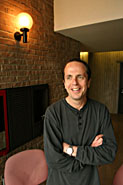Studying autistic kids
The popular computer game MYST is a lonely quest for clues to solve mysteries, where the player travels through portals to dramatically different and eerily isolated landscapes. McGill's version of MYST also involves solving mysteries, but the process is anything but a lonely one.

Jake Burack, MYST director
Owen Egan
The McGill Youth Study Team (MYST) is a research group of graduate students in areas such as educational psychology, visiting professors and collaborating researchers from across Canada. Jake Burack, developmental psychology professor and director of MYST, says the team focuses on research in children with learning disabilities and resilience in aboriginal youth.
In addition to their research, MYST members present at conferences and do education at the local level through presentations at school boards on developmental disabilities in children. Burack himself is on the editorial boards of journals, such as the Journal of Intellectual Disability Research, and is on the board of directors of the local organizations Miriam Home for the Exceptional and Summit School, which serve people with developmental disabilities.
MYST members offer testing and assessment of children for autism and genetic syndromes, such as fragile X or Down syndrome, at the Canadian Centre for Cognitive Research and Neurodevelopmental Disorders at Hôpital Rivière-des-Prairies, which they share with the Université de Montréal.
Burack says the team's research work is oriented to the type of syndrome or disability the child has. "In a group of kids with intellectual disabilities, we try to highlight that each of these syndromes has specific characteristics. In the old style of research, they would lump all types of intellectual disabilities together, but we see the specific syndromes and each one has its own characteristics."
PhD student and MYST member Natalie Russo says that looking for specifics makes a difference when testing children with autism. "I'm looking at cross-modal processing, whether information comes in auditorially or visually, and how that affects their ability to perform tasks. Typically developing children tend to do better when given verbal instructions, and we know that kids with autism have a visual and spatial strength." This affects results for the child with autism when they are tested for mental age and IQ.
Doctoral student Tara Flanagan explains, "In autism research we find that for the full-scale IQ tests, where you give verbal instructions, you tend to underestimate people with autism and their IQs."
The second area MYST is involved with is risk and resilience in aboriginal youth. Burack says that they look at the types of at-risk behaviour usually examined for teenagers, such as school drop-out rates, grades and substance abuse. PhD candidate in educational psychology Rhoda Root plans to focus her upcoming research on resilience in aboriginal youth in Cree and Inuit communities.
"I'm looking at factors such as family, extended family and cultural identity, as well as attachment to parents and family, because these are factors that would be considered important. These are factors that would protect any adolescent. We want to see if there's anything unique about (resilient youth) that would help other kids."
"MYST has also done work with other aboriginal groups," points out Root. "You can't generalize and say everybody's the same. You have to look at different groups in different areas, in different parts of cities and in isolated areas."
"Communities have their own strategies," says Burack. "We're trying to understand what they themselves do to promote a positive outcome for their kids. We're interested in the link between cultural identity and positive outcome." He notes that their studies so far have shown that adolescents who are proud of their cultural identity and knowledgeable of their culture tend to be more resilient and are able to overcome difficult times in their lives more readily.
The students all agree that there are advantages to being part of MYST that go beyond getting their degree. Flanagan says she appreciates the interaction and that the perspectives of others who are more clinically based balance her own research focus. Russo adds that team members create a social support network for each other: "I like being able to discuss ideas and thoughts with a bunch of people who are unbelievably dedicated to this type of work."
Burack says he tries to have a mentoring system in the group by linking up senior grad students with the more junior grad students.
He is taking his mentoring approach further. "We have funding from the Canadian Institute for Health Research. I'm one of the mentors of an Autism Research Training Program (ART) aimed at developing expertise in Canada."
There are surprisingly few researchers focusing on autism in the country. Burack points out that there are currently only about 20 autism researchers across Canada. ART connects experts from nine universities across Canada with students and professionals, such as social workers, who are already in the field and who want further education. The training kicks off this summer with an intensive summer school program. Burack doesn't sound at all concerned about the addition to his workload. He says his team will keep things running smoothly.
